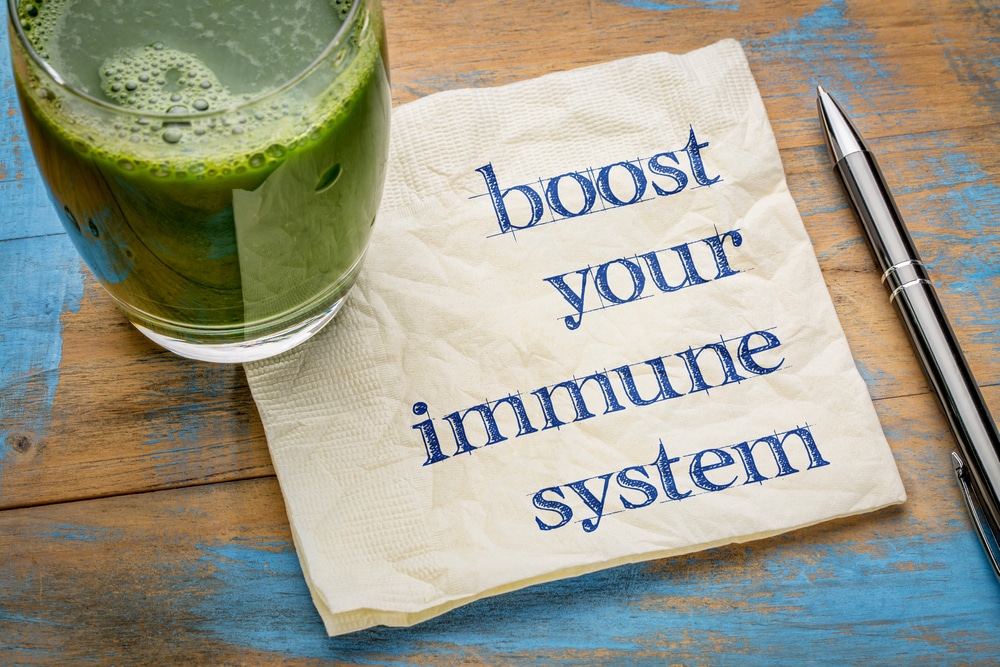A healthy immune system is vital for the body to function effectively.
Although everyone is born with a natural immunity, also known as innate immunity, various lifestyle factors have the ability to influence your immune response. Abnormalities of the immune system can result in the development of autoimmune disorders and other illnesses, and may be triggered by unhealthy eating habits, poor lifestyle choices or underlying health conditions.
To ensure you’re living your best life and nourishing your wellbeing, we’ve developed a list of healthy living strategies, which will empower you with the knowledge to boost your immune system.
Understanding the human immune system
Before we dive into a list of the best ways to nurture your wellbeing, let’s first understand more about the immune system, what it does and why it’s so important.
The immune system is a complex system, with our white blood cells (or leukocytes) playing a vital role in overall effectiveness. This network comprises organs, proteins and cells that work together to identify antigens and eradicate them from the body.
One aspect of the immune system, to be truly marvelled at, is its ability to record and remember each microbe strain it has defeated, throughout an entire lifetime. By doing so, the immune system is able to identify and eliminate a returning microbe rapidly, if the body is infected by it again in the future. Although this is a highly effective method for preventing illnesses with a unique strain, such as chickenpox, it is less effective to prevent colds or flu like symptoms, as there are many different strains for viruses of these types.
A healthy immune system plays a key role in promoting wellbeing, but it is also important to understand that it is very common for people to have either an overactive or underactive immune system.
If we get back to basics, hidden behind the curtain of complexity, the primary function of the immune system is to act as the body’s first line of defence against sickness and infections.
The danger of compromised immune function
When our immunity is compromised, the body is more vulnerable to sickness, as it is unable to effectively fight infection and prevent disease.
Comparable to an underactive immune system, symptoms of an overactive immune system are more regularly seen in everyday life, in the form of allergies, sinus conditions, asthma, dermatitis and eczema. Autoimmune diseases are also the result of overactivity, occurring when an immune response attacks healthy or normal components of the body. Some of the most common autoimmune conditions include type 1 diabetes, rheumatoid arthritis and multiple sclerosis.
People with an underlying health condition often have a higher risk of compromised immunity, due to the body already fighting off infection and disease, resulting in a decreased capability of protecting the body against any additional infection. For instance, while most people may be able to fight off the more serious symptoms associated with influenza, those with an unhealthy immune system are more likely to experience a higher severity of symptoms. This low tolerance to infection can often lead to someone developing more health complications in the future.
When is immune function most at risk?
In relation to someone’s medical history, certain people will have a greater concern for developing illness due to a weakened immune system. When we consider the general population, however, people are more susceptible to developing impaired immune function throughout various life stages and even through seasonal changes.
During flu season, for instance, your immune function is working to protect your body from the increased number of infections within the community, causing it to become more vulnerable to deterioration. With a poorly functioning immune system, even a common cold has the power to wreak havoc on our health and wellbeing.
Ageing and the immune system
Immune cells weaken as a natural part of ageing. Immune function is most at risk for adults over the age of 70. On the opposite end of the scale, most children do not have a fully developed immune system until around 8 years old. It is vital that parents promote positive lifestyle choices during this stage of underdeveloped and subdued immune function, to ensure children stay healthy and happy.
Pre-existing health conditions and other illnesses can also result in immune function being more at risk, including heart disease, chronic stress, viral infection, chronic fatigue and glandular fever.
Essential nutrients for a strong immune system
Nutrition and immunity go hand in hand.
It is possible to boost your immune system naturally, by ensuring your body receives the essential nutrients for optimal functionality. While oral supplements are an option for boosting immunity, a balanced diet is the most effective way to naturally maintain a healthy immune system.
The following nutrients are identified as critical for the proper functioning of immune cells:
- Vitamin C
- Vitamin D
- Vitamin E
- Selenium
- Zinc
- Iron
- Protein
Not only do these nutrients play a key role in maintaining a functional immune system, but can also assist in elevating your overall health and wellbeing, throughout other aspects of your everyday life.
As an example, Vitamin C assists in the absorption and retention of iron, helping to reduce overall fatigue. Additionally, Vitamin E works wonders to keep skin healthy, offering a more radiant complexion.
Vitamin D also plays a primary role in the ability to reduce inflammation caused by T cells. Inflammation of cells in the lungs can lead to serious health concerns and difficulty breathing.
Synthetic health supplements
Alongside the list of nutrients essential to a healthy immune system, there has also been a great deal of research conducted, with the aim of assessing the viability and potential side effects of other treatments and supplements on the market.
Beta carotene, for instance, has been assessed as a means to increase the quantity of immune cells and associated activity. While some promising results were seen in healthy participants of the study, further peer reviewed studies revealed that synthetic beta carotene may be linked to increased likelihood of lung cancer in patients with a history of smoking.
To ensure patient safety and better understand the potential risk factors of beta carotene and other supplements, more research will need to be continued in the future. When considering alternative treatments for improving your immune system, always consult your doctor.
How to boost the immune system naturally
In combination with a healthy diet, small lifestyle changes can also assist in nurturing your immune system and overall wellbeing.
Adequate sleep seems like somewhat of a myth for those living busy lives, however, healthy sleep habits are the key to promoting better health and wellbeing. When we get enough sleep, our brain function is more productive, we have a decreased likelihood of heart disease and our immune response works more effectively.
When accompanied by enough sleep, the practice of regular exercise and physical activity acts as a modulator, which will nurture the immune system, boost the healing capabilities of the body and lower the chances of contracting viral infections. Those who exercise regularly are able to better modulate the pro and anti inflammatory effects of the immune system, both during and after engaging in physical activity.
Choosing to exercise regularly, reach for healthier food options and promote better sleeping habits are all practices that will reduce stress, allowing for optimal functioning of the immune system.
Choose a healthy diet to boost immunity
Although supplements are often the first choice for someone with a busy lifestyle, there is no comparison for the benefits achieved by adhering to a well balanced diet.
Experiment with different cooking methods
When it comes to the immune system, our focus should not only be on types of foods we are choosing, but also how we choose to cook these select foods. As a general rule, steaming vegetables is the best technique to avoid unnecessary cooking oils. When compared with boiling, steaming cooking methods also allow for better retention of nutrients, such as Vitamin C, B and a variety of antioxidants.
The best foods to boost your immune system
A balanced diet is important for nurturing your overall health and wellbeing, but there are also certain foods that will be extra beneficial for boosting immunity. Research in the field of clinical nutrition have identified some of the best foods as those which offer powerful antioxidant properties, including:
-
Garlic
-
Ginger
-
Red bell peppers
-
Citrus fruits
-
Sunflower seeds
-
Chicken soup
-
Green vegetables (particularly broccoli and spinach)
Sweet potatoes offer the richest natural resource for beta carotene, a compound that the body converts to Vitamin A. While the long term effects of the synthetic formula of this compound require additional research, sweet potatoes may offer a natural solution.
Eating a variety of fruits daily can also give your immune system a boost, with many citrus fruits delivering a high does of Vitamin C. Additionally, fruits like blueberries contain antioxidants that support overall health and wellbeing.
If you’re searching for a healthy snack alternative, sunflower seeds and other foods that contain zinc are a convenient choice. Not only do sunflower seeds contain zinc, but also selenium, both of which support the immune system and increase the capability to protect against infections.
Boost immunity with a cup of tea
Most people will understand the relaxing feeling that comes with kicking your feet up and enjoying a nice cup of tea. In addition to relaxing and alleviating stress, a cup of green tea will also strengthen the immune system, protecting against radicals and oxidants.
Avoid processed foods
Processed foods are often the most convenient solution for a busy lifestyle, but they can be detrimental to your health in more ways than one. Most processed fast foods are packed with refined carbohydrates, which increase inflammation and impede proper functioning of the immune system.
Supplements to elevate immune health
If you’re struggling to maintain a healthy diet each day, certain vitamins and dietary supplements may offer an alternative solution. Many people face difficulties with reaching a daily intake of food that adequately provides the essential nutrients needed for good health.
You should always consult with your doctor before commencing a course of supplements, to ensure they’re right for you. While some people may only require a single vitamin, others may require a multivitamin or a variety of supplements to achieve their health goals.
Understanding recommended vaccines and how immunisation works
As outlined by the Australian Government Department of Health and Aged Care, “vaccines strengthen your immune system by training it to recognise and fight against specific germs.”
The aim of vaccination is to expose the immune system to a small dose of infection, without causing illness, to trigger a response that creates antibodies that protect against infection of the same strain in the future.
Research from the American Journal of Immunology reveals that the recommendation of vaccines will be highly dependent upon the medical history of a patient. In many cases, immunisation is recommended to prevent against future health complications. If someone already has a compromised immune system, however, vaccines may not be recommended, due to reduced efficacy or increased risk of adverse effects.
Vaccination is a personal choice and should be guided by your medical history and the direction of your treating physician.
5 Signs you may have a weak immune system
People develop compromised immune systems for a number of reasons, but there are some common warning signs that point towards someone having deficient immunity, including:
-
Elevated and consistent stress
-
Frequently having a common cold
-
Issues with bowel and digestion
-
Lengthy healing time for wounds
-
Ongoing fatigue or exhaustion
Health benefits of a strong immune system
Alongside the most noticeable benefits of a strong immune system, there are many secondary advantages you will soon begin to notice, such as a good health, hydrated skin and more energy for enjoying life at its best.
A healthy immune system will allow you to better fight inflammation, reducing the chance of developing serious symptoms from chest and lung infections. Additionally, the body is able to regenerate skin and tissue at a great rate, promoting enhanced healing of wounds and cuts.
We’re here to help
Life is full of the unexpected and it’s important to take control of your wellbeing and stay healthy – so you’re ready for whatever life has to offer. Whether it’s boosting your immunity or a general health consultation, start a conversation with a hub.health doctor today – we’re here for you.





